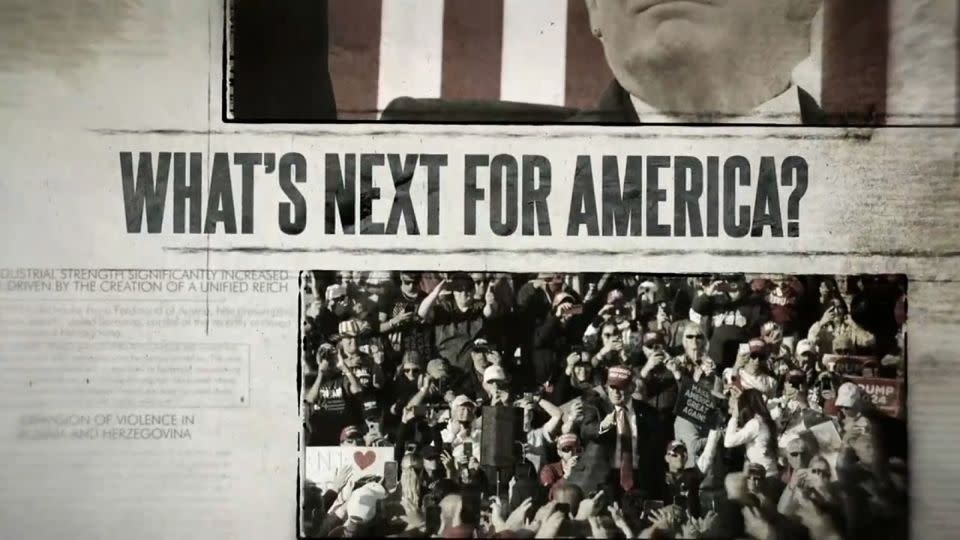Trump removes video referencing ‘unified Reich,’ but his Nazi allusions are long-standing
- Oops!Something went wrong.Please try again later.
- Oops!Something went wrong.Please try again later.
- Oops!Something went wrong.Please try again later.
Donald Trump dabbles in Nazi allusions too often for it to be a coincidence.
The latest example is a video posted on the ex-president’s social media account that features a fake headline implying the US could become a “unified Reich” if he wins a second term in November. The video replicates what appears to be World War I-era newspapers. But the term “Reich,” which means a kind of empire, is also synonymous with the later Third Reich of Adolf Hitler’s Nazi Germany. The presumptive GOP nominee’s campaign insisted the sharing of the third-party video on Monday was the work of a staffer and not Trump, who was in court. It was eventually taken down hours later on Tuesday.
Trump may not have not been responsible for the post. But campaigns reflect the character of the candidate. And Trump has been flirting with Nazi imagery and giving comfort to far-right extremists for years. He recently accused President Joe Biden of running a “Gestapo” administration. Trump has several times warned immigrants are “poisoning the blood” of the United States, echoing language used by Hitler in his manifesto “Mein Kampf,” which the ex-president claims he hasn’t read. Back in 2017, Trump equivocated about condemning a White supremacist rally in Charlottesville, Virginia, in which marchers chanted “Jews will not replace us.”

Trump also allegedly praised Hitler, according to former White House chief of staff John Kelly, who was quoted by CNN’s Jim Sciutto in his new book “The Return of Great Powers.” Kelly commented: “He said, ‘Well, but Hitler did some good things.’ I said, ‘Well, what?’ And he said, ‘Well, [Hitler] rebuilt the economy.’”
Sciutto also cited Kelly as saying that Trump believed that Hitler’s hold on senior Nazi officers displayed a loyalty he did not enjoy from his senior subordinates. When the book was published, Trump campaign spokesman Steven Cheung did not comment on the substance of the allegations from Kelly and another former White House official, former national security advisor John Bolton. But he accused them both of “suffering from a severe case of Trump Derangement Syndrome.” In 2021, a Trump spokeswoman denied the former president had praised Hitler.
Some of Trump’s rhetoric suggests an ignorance of history and his own self-obsession. But it must also be viewed in the context of a past and possibly future president who admires present day tyrants and dictators and has vowed to use the powers of the presidency to enact personal and political retribution. He’s promising the biggest deportation operation in history to expel undocumented migrants. And his echoing of Nazi rhetoric on immigration has the same consequence as Hitler’s — to demonize outsiders supposedly threatening the ‘native’ purity of the homeland.
Trump has already tried to avoid leaving power after a democratic election he lost, whipping up his supporters ahead of the January 6, 2021, attack on the US Capitol. And over the weekend, he spitballed about potentially serving more than the two terms to which the Constitution says he can be elected. Some of Trump’s rhetoric seems designed to get a rise from his opponents and the media. But a strongman’s aspirations lay behind it. And the searing demagoguery of his rallies increasingly resembles a tyrant’s theatrics.
Biden seized on the latest evidence of extremism in Trump’s orbit by telling Democratic donors in Boston on Tuesday that “this is the same guy that uses Hitler’s language, not America’s.” He also used the furor to bolster his warnings that Trump’s return to the White House would be a disaster for democracy. “The threat that Trump poses is greater in the second term than it was in the first.”
It’s a good rule in politics that no one should use Nazi-themed rhetoric or allusions. Even Trump critics who portray him as an aspiring Nazi tyrant contribute to an erosion of the record about some of humanity’s most heinous crimes. And as extreme as a second Trump term might be, the Nazi Germany comparison feels extreme. Analogies to the autocratic rule and democratic dismantling taking place under his friend, Hungarian Prime Minister Viktor Orbán, seem more on point.
The casual proliferation of Nazi references is especially troubling at a moment when echoes of the 1930s are everywhere. Russian President Vladimir Putin’s invasion of Ukraine recalls Hitler’s European expansionism. Israel has just suffered the worst attack on Jews since the Holocaust, in the October 7 Hamas terror attacks. And there’s been an upsurge of antisemitism in the United States. Anti-Jewish hate has infiltrated some pro-Palestinian protests initially motivated by anger over the civilian carnage of Israel’s war in Gaza. Some of Trump’s GOP allies have highlighted some antisemitic incidents on college campuses to distract from Trump’s past use of antisemitic tropes, including his attacks on American Jews who vote Democrat and his implications they have dual loyalties to the US and Israel.
The rising use of both Nazi innuendo and antisemitism suggest a troubling trend — the receding of the lessons of World War II and the Holocaust. The public’s collective memory is fading as the Baby Boomers who grew up in the shadow of their parents’ exploits in the 1940s Greatest Generation also begin to pass on.
Anyone who admires Hitler and his murderous cult would do well to walk through the preserved death camps, gas chambers and mass crematoria in Eastern Europe where Nazis exterminated the continent’s Jews. And those who carelessly peddle Nazi-themed rhetoric should visit the cliffs of Normandy, where Biden is expected next month to mark the 80th anniversary of D-Day amid rows of buried US and Allied soldiers who perished as part of the cost of eradicating fascism.
For more CNN news and newsletters create an account at CNN.com

